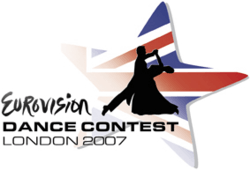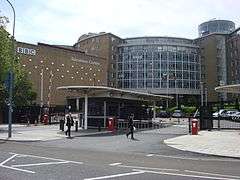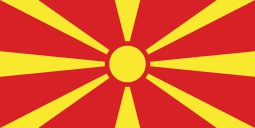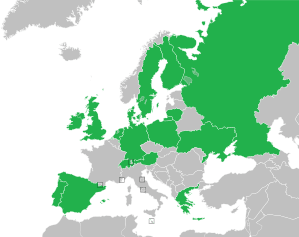Eurovision Dance Contest 2007
The Eurovision Dance Contest 2007 was the inaugural edition of the Eurovision Dance Contest, a dance competition co-production between the European Broadcasting Union (EBU) and host broadcaster BBC. The first ever pan-European dance competition was held on 1 September 2007 in London, United Kingdom with the participation of 16 countries.
| Eurovision Dance Contest 2007 | |
|---|---|
 | |
| Dates | |
| Final | 1 September 2007 |
| Host | |
| Venue | BBC Television Centre,[1] London, United Kingdom |
| Presenter(s) | Graham Norton Claudia Winkleman[1] |
| Directed by | Nikki Parsons |
| Executive supervisor | Tal Barnea |
| Executive producer |
|
| Host broadcaster | British Broadcasting Corporation (BBC) |
| Interval act | Enrique Iglesias performing "Do You Know? (The Ping Pong Song)" |
| Participants | |
| Number of entries | 16 |
| Debuting countries | |
Participation map
| |
| Vote | |
| Voting system | Each country awards 1–8, 10, and 12 points to their 10 favourite acts. |
| Nul points | |
| Winning dancers | Katja Koukkula and Jussi Väänänen |
Viewers cast their votes by telephone and SMS text message voting on each couple's two dances – the first being ballroom or Latin with the second being freestyle, with a "national" flavour. Professional dance couples were allowed to enter the competition. Comedian Graham Norton and Claudia Winkleman presented the 2007 contest from the BBC Television Centre in London.
The first ever winners of the contest were Katja Koukkula and Jussi Väänänen of Finland who received a total of 132 points. 2nd place went to Ukraine, 3rd to Ireland, 4th to Poland and 5th place to Austria following a tie with Portugal, who also received 74 points.
Location

The host venue was the BBC Television Centre, White City, London, which opened in 1960. It is one of the most readily recognisable facilities of its type having appeared as the backdrop for many BBC programmes. It remained to be one of the largest such facilities in the world until it closed in March 2013.[2]
Production
The contest was hosted by the BBC,[3] and was a co-production by Splash Media – run by the developers of its successful Strictly Come Dancing format – and sports production house Sunset + Vine – with help from the International DanceSport Federation and in association with the European Broadcasting Union.
The contest was broadcast in English and French languages, although France did not take part.[4] Each broadcaster also had the option of providing its own commentators at the event. UK commentators were Len Goodman and Bruno Tonioli.
Participants
The Croatian broadcaster HRT had expressed an interest in taking part,[5] but pulled out due to costs and scheduling problems.
As well as those countries that took part, Albania, Armenia, Belarus, Bosnia and Herzegovina, Cyprus, Iceland, Israel and Macedonia also broadcast the contest despite not taking part in it, with possibility to join it in 2008.[6]
The running order for the 16 participants was announced on 6 August 2007 and had been determined in two steps. In the first round, the participating countries were drawn into groups, under supervision of an auditor. In the second round, the producers of the contest determined the final running order within the drawn groups to assure variety in the live show.[7]
Due to the forest fires in Greece, the Greek national broadcaster ERT did not air the show live and therefore used a back-up jury instead of televoting.[8]
Austria and Portugal both finished with the same number of points, however, Austria received points from every other participating nation thus receiving points from more countries than Portugal, hence Austria took 5th place.
| Draw | Country | Dancers | Dance Styles | Place | Points |
|---|---|---|---|---|---|
| 01 | Denise Biellmann and Sven Ninnemann | Paso Doble and Swing | 16 | 0 | |
| 02 | Mariya Sittel and Vladislav Borodinov | Rumba and Paso Doble | 7 | 72 | |
| 03 | Alexandra Matteman and Redmond Valk | Cha-Cha-Cha and Rumba | 12 | 34 | |
| 04 | Camilla Dallerup and Brendan Cole | Rumba and Freestyle | 15 | 18 | |
| 05 | Kelly and Andy Kainz | Jive and Paso Doble | 5 | 74 | |
| 06 | Wolke Hegenbarth and Oliver Seefeldt | Samba dance and Freestyle | 8 | 59 | |
| 07 | Ourania Kolliou and Spiros Pavlidis | Jive and Sirtaki | 13 | 31 | |
| 08 | Gabrielė Valiukaitė and Gintaras Svistunavičius | Paso Doble and Traditional Lithuanian Folk Dance | 11 | 35 | |
| 09 | Amagoya Benlloch and Abraham Martinez | Cha-Cha-Cha and Paso Doble | 10 | 38 | |
| 10 | Nicola Byrne and Mick Donegan | Jive and Fandango | 3 | 95 | |
| 11 | Katarzyna Cichopek and Marcin Hakiel | Cha-Cha-Cha and Showdance | 4 | 84 | |
| 12 | Mette Skou Elkjær and David Jørgensen | Rumba and Showdance | 9 | 38 | |
| 13 | Sónia Araújo and Ricardo Silva | Jive and Tango | 6 | 74 | |
| 14 | Yulia Okropiridze and Illya Sydorenko | Quickstep and Showdance | 2 | 121 | |
| 15 | Cecilia Ehrling and Martin Lidberg | Paso Doble and Disco Fusion | 14 | 23 | |
| 16 | Katja Koukkula and Jussi Väänänen | Rumba and Paso Doble | 1 | 132 |
Scoreboard
| Wikinews has related news: |
The following 16 countries took part,[4][9] and received the scores shown below.
| Voters | |||||||||||||||||
|---|---|---|---|---|---|---|---|---|---|---|---|---|---|---|---|---|---|
| Switzerland | |||||||||||||||||
| Russia | 3 | 10 | 3 | 7 | 6 | 4 | 5 | 4 | 8 | 12 | 10 | ||||||
| Netherlands | 5 | 7 | 2 | 12 | 3 | ||||||||||||
| United Kingdom | 3 | 5 | 7 | 3 | |||||||||||||
| Austria | 7 | 3 | 5 | 2 | 10 | 2 | 3 | 3 | 4 | 6 | 8 | 5 | 5 | 4 | 7 | ||
| Germany | 10 | 5 | 6 | 10 | 7 | 5 | 7 | 6 | 1 | 2 | |||||||
| Greece | 2 | 4 | 1 | 5 | 4 | 5 | 4 | 2 | 1 | 2 | 1 | ||||||
| Lithuania | 1 | 6 | 4 | 12 | 1 | 1 | 6 | 3 | 1 | ||||||||
| Spain | 6 | 2 | 2 | 7 | 12 | 4 | 5 | ||||||||||
| Ireland | 1 | 10 | 7 | 8 | 6 | 3 | 1 | 8 | 5 | 10 | 12 | 3 | 8 | 7 | 6 | ||
| Poland | 4 | 8 | 4 | 7 | 8 | 12 | 1 | 6 | 10 | 4 | 10 | 10 | |||||
| Denmark | 1 | 1 | 6 | 7 | 2 | 3 | 4 | 2 | 8 | 4 | |||||||
| Portugal | 12 | 6 | 8 | 3 | 2 | 8 | 8 | 2 | 12 | 2 | 3 | 6 | 2 | ||||
| Ukraine | 3 | 12 | 10 | 12 | 5 | 6 | 5 | 12 | 8 | 6 | 12 | 6 | 7 | 5 | 12 | ||
| Sweden | 1 | 1 | 7 | 5 | 8 | ||||||||||||
| Finland | 8 | 7 | 12 | 4 | 12 | 4 | 10 | 10 | 10 | 8 | 8 | 10 | 10 | 7 | 12 | ||
12 points
Below is a summary of all 12 points in the contest:
|
International broadcasts and voting
Voting and spokespersons
The order in which each country announced their votes was done in order of performance. The spokespersons are shown alongside each country.[8]
















Commentators
Most countries sent commentators to London or commentated from their own country, in order to add insight to the participants and, if necessary, provide voting information.
Participating countries
















Non-participating countries









References
- "BBC - Press Office - Taking the floor: Eurovision Dance Contest". www.bbc.co.uk. Retrieved 8 May 2019.
- "Dyke accused of conflict of interest over £6m holding in rival TV firm". The Independent. London. 17 January 2000.
- "BBC - Press Office - The last dance for Camilla and Brendan". www.bbc.co.uk. Retrieved 8 May 2019.
- EBU.CH :: Eurovision Dance Contest Archived 2007-01-12 at the Wayback Machine
- "Eurovision Song Contest". 16 February 2007. Archived from the original on 16 February 2007. Retrieved 9 May 2019.
- "Eurovision Dance Contest 2008 Glasgow Танцевальное Евровидение 2008 Глазго". esckaz.com. Retrieved 8 May 2019.
- "Eurovision Dance Contest". 12 November 2007. Archived from the original on 12 November 2007. Retrieved 8 May 2019.
- Viniker, Barry (30 August 2007). "EDC voting spokespersons announced". ESCToday.com. Retrieved 16 June 2013.
- "Eurovision Dance Contest unveiled". BBC News. 13 April 2007. Retrieved 2 May 2010.
- "Archived copy". Archived from the original on 2012-04-25. Retrieved 2011-10-27.CS1 maint: archived copy as title (link)
- Mikheev, Andy (1 September 2007). "Eurovision Dance Contest 2007". News Archives (in English and Russian). ESCKaz.com. Retrieved 9 June 2013.
- "Юлія Окропірідзе та Ілля Сидоренко стали другими у Європі!". NTU. Archived from the original on October 30, 2007. Retrieved 12 June 2013.

